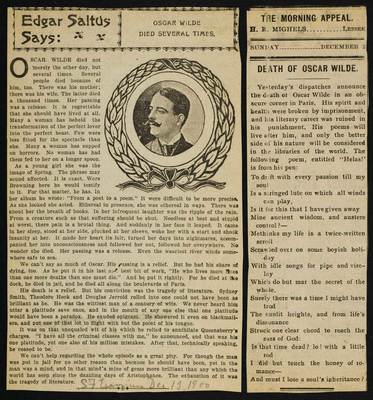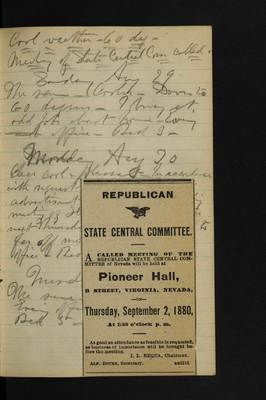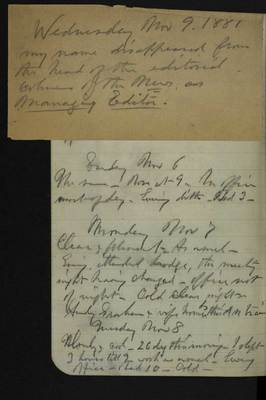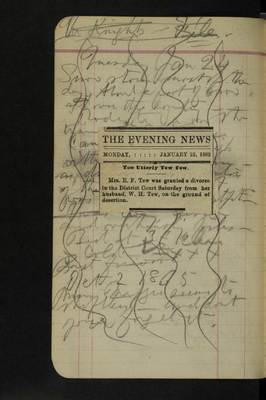Pages
76_bkinside4_c
SAN FRANCISCO CHRONICLE December 1, 1900.
OSCAR WILDE DIES IN POVERTY IN PARIS
Dismal End of the Man Who Wrote Some of the Most Brilliant Plays of the Period.
NEW YORK, November 30. -- The Herald's London cable says: Oscar Wilde died at 2:30 o'clock this afternoon at a small hotel in the Latin quarter of Paris. For the previous three days he had lain unconscious, or in a delirium, from the effects of an abscess in his ear, which the doctors could not locate exactly. The inflammation from this gradually mounted to his brain. He died attended by a few faithful friends, who declined to accept the general verdict of the world against him. His end may be compared to that of Verlaine. It is interesting to note that "Mr. and Mrs. Daventry," the play with the authorship of which Wilde was credited, is now the rage. The majority consider it very shocking, and every one rushes to see whether it is as bad as reported. Wilde, it is declared, was receiving one-fourth of the profits of the piece, in which Mrs. Patrick Campbell appears.
DUBLIN, November 30. -- A dispatch to the Evening Mail from Paris says Oscar Wilde died in an obscure house in the Latin quarter from meningitis and was received into the Catholic church on his deathbed. He had been living in a hotel on the Rue des Beaux Arts, where he had been known for several months under the name of Manmoth. For some time he had been indisposed. In October he was obliged to submit to a serious operation, from the effects of which he never recovered. He died at 2 o'clock this morning at the Mason du Pierrier, an obscure hotel, in the presence of Lord Alfred Douglas.
PARIS, December 1. -- The Journal says it is rumored that Wilde committed suicide.
Oscar Wilde will be remembered as the man who deliberately and with malice aforethought developed the aesthetic fad in England, which was so deliciously travestied by Gilbert and Sullivan's "Patience" and so humorously caricatured by Du Maurier in his drawings in Punch. It was a great tour de force and showed that Oscar, if he had not turned his attention to poetry and dramatic art, would have made a great actor. He will also be remembered for his half-dozen plays, which scored an immense success in England, as well as in this country and for several closet plays, notably "Salome."
Oscar Wilde came to this country in 1881 and delivered 200 lectures on art. He adopted the costume which was made ludicrous by Bunthorne in the comic opera and wore his hair long, but he had the laugh on Americans, for he took back with him a large amount of good gold coin.
Of his plays "Lady Windermere's Fan" and "A Woman of No Importance" were the most successful. But everything he touched in a dramatic way seemed to succeed, for at the time of his exposure by Queensberry and his sudden downfall he had no less than six plays on the boards in London and the provinces. Of his purely literary work little will survive except a few poems and essays. His most brilliant essay was "The Decay of the Art of Lying." His novel, "The Picture of Dorien Gray," was brilliant in style, but it gave glimpses of the abnormal vices that led to his ruin.
Oscar Wilde was born in Dublin in 1856, of parents who held high places in the world of letters. He came naturally by his literary gifts. His father was Sir William R. Wills Wilde, M. D., surgeon-oculist to her majesty, antiquarian, statistician, litterateur, and his mother, Jane Francesca, Lady Wilde, author of several volumes of poems and prose. He was educated at the royal school at Enniskillen, was a scholar of Trinity College, was awarded the Berkeley medal for Greek, and went to Oxford in 1874. There he won prizes in 1876 and 1878, the latter for English poetry. The esthetic movement he originated when he went to London in 1879. He was a contributor to the leading monthlies and quarterlies of Great Britain, and he developed a remarkable ability as a playwright. He wedded Miss Constance Lloyd in 1884. He leaves two children -- Cyril, 15 years old, and Vivian, 14. Mrs. Wilde died in France in April, 1898.
The great scandal of five years ago that caused the complete downfall of Wilde is too well remembered to call for repetition, except briefly. Wilde, who had as a close friend Lord Alfred Douglas, a son of the recently deceased Marquis of Queensberry, caused the arrest of the Marquis in March, 1895, on a charge of libel. The case collapsed, however, and Wilde was immediately arrested on a charge of offenses against morality, and he was convicted after a sensational trial lasting several days. Wilde was sentenced to two years' imprisonment with hard labor, and he served the full term. When released in May, 1897, he was a mere wreck of his former self.
Since his release Wilde had lived in France, and is said to have suffered many hardships. Lately, it was reported, he had been almost destitute.
---------------
SAN FRANCISCO EXAMINER December 1, 1900.
OSCAR WILDE DEAD AND SUICIDE IS SUSPECTED
Was Living in Obscure Lodging-House Under Assumed Name With the Purpose of Concealing His Identity.
When He Realized Death Was Near He Sent For His Friend Lord Alfred Douglas Who Remained With Him.
Accomplished Things in Literature Which Brought Fame to be Blackened by Revelations at Great Trial.
(By cable to New York and via leased wire, the longest in the world. Copyright, 1900, by W. R. Hearst.)
PARIS, November 30. -- Oscar Wilde died at 2 o'clock this morning at the Maison du Peirier, an obscure hotel on the Rue des Beaux Arts, where he had been living for several months under the assumed name of Manmoth. Wilde was suffering from meningitis. No one knew who he was until near the end, when he sent for Lord Alfred Douglas. Lord Alfred was with him when he died. In October Wilde was obiliged to submit to a surgical operation. From this time he grew worse. "Le Journal" says that it is rumored in the Latin quarter that Wilde committed suicide. On the other hand there is a report that he was received into the Catholic church on his death bed and died peacefully.
Since coming to the MaIson du Peireier Wilde had been in almost abject poverty. He had entirely subsisted on the bounty of his friends in England. It appears now that a considerable sum of money was soon to come to him in the way of royalty on his new play, "Mr. and Mrs. Daventry," which is now the sensation of the London stage. It is not known whether he was aware of this. For the last three days Wilde had been unconscious or in a delirium from an ear abscess.
And so has passed away the phosphorescent genius who worked a reform in the literature of England comparable only to what Paul Verlaine worked in that of France.
Oscar Wilde was a meteor. He was born in 1855, the son of an eccntric but clever Dubln surgeon and a woman who wrote prettily under the name of "Spiranza." Educated at Oxford, the young Wilde formed associations with many of the world's genius. He was a friend of Whistler, of George Meredith, of Bernard Shaw.
He found his country a prey to "this puritanism that is always marring the artistic instinct of the English" -- to quote his own words in reply to the St. James' Gazette's scathing criticism of his novel, "The Picture of Dorian Gray." It seemed as if he started out to upset this puritanism.
Something of a charlatan, very much of a poseur, there is no doubt the artistic instinct in him was not marred by any shadow of puritanism. He amazed London by the oddity of his dress, by his remarks about living up to the liy" and being "disappointed in the Atlantic." He founded the school -- or fad -- of aestheticism and was gloriously caricatured by Du Maurier in "Punch" and satirized by W. S. Gilbert, who made him, under the name of Bunthorne the hero of "Patience."
He wrote an amazing essay, "Philosophy for the Young," in which he sought to teach the cult of beauty. He staggered Mrs. Grundy with "The Green Carnation" and brought down upon his head the denunciation of all the puritanism of two continents by the sensual "Picture of Dorian Grey."
"Lady Windermere's Fan," his first dramatic venture, marks an epoch in the history of the English stage. It was so daring in its treatment of topics that no dramatic author had hitherto dared touch that the critics were bewildered. They admitted its art -- one of them said it was full of "Epigrams like a series of copy-book headlines set in fireworks" but they made the mistake of criticising it from the ethical instead of from the artistic standpoint. Immoral it was, but with the brilliant immorality of Petronius and Sappho. The revolution it worked is best seen in the way that all the greatest authors became its imitators. Henry Arthur Jones, A. W. Pinero, Sidney Grundy, Haddon Chambers, Clement Scott and many others have been giving to the world ever since a series of plays dealing with problems hitherto discussed only in whispers.
Even Sarah Bernhardt fell a victim to its charm and at her request Wilde wrote "Salome," and wrote it in French, a feat that no other Englishman, unless it be Swinburne, could have done. And Bernhardt played it. London would not have it. The Lord Chamberlaiin put it under the ban, but Oscar cared not for this when he heard his lines spoken by the sweetest voice ever created, as he wrote. "Salome" was a stupendous success in Paris.
"A Woman of No Importance" followed. Rose Coghlan was playing it here when the grand crash came in 1895. The revelations at the famous trial so disgusted her that she withdrew the play in the middle of a tremendous run.
Wilde's trial in the Old Bailey appalled the civilized world. The old Marquis of Queensberry had thrashed his son, Lord Alfred Douglas, for being seen in the street with Wilde, and had written to the papers denouncing the idol of the aesthetes. Wilde sued him for libel and the old Marquis proved his charges, with the result that Wilde went to prison, the halo of his glory blackened, himself an outcast.
A letter was read at the trial, a letter from Oscar Wilde to Lord Alfred Douglas which damned Wilde. Stories were told of tea parties at which perfumes were burned in darkened rooms and orgies took place that would have made the Lesbian Aphrodite blush.
A few weeks ago Wilde was found in lodgings in the Quartier Latin, in Paris, very ill and destitute. His friends supplied nurses and doctors and did all they could to make the end as gentle as possible.
But the meteor had burned itself out. And Wilde is no more. the world owes to his memory gratitude for the defeat of extreme puritanism and the broadening of English thought, but it may not in charity sit in judgment upon him as a man, for only his father confessor knows the truth about his end.
76_bkinside5_c
SAN FRANCISCO EXAMINER December 13, 1900
Edgar Saltus Says: OSCAR WILDE DIED SEVERAL TIMES.
OSCAR WILDE died not merely the other day, but several times. Several people died because of him, too. There was his mother; there was his wife. The latter died a thousand times. Her passing was a release. It is regrettable that she should have lived at all. Many a woman has beheld the transformation of the perfect lover into the perfect beast. Few were less fitted for the spectacle than she. Many a woman has supped on horrors. No woman has had them fed to her on a longer spoon.
As a young girl she was the image of Spring. The phrase may sound affected. It is exact. Were Browning here he would testify to it. For that matter, he has. In her album he wrote: "From a poet to a poem." It were difficult to be more precise. As she looked she acted. Ethereal in presence, she was ethereal in ways. There was about her the breath of books. In her infrequent laughter was the ripple of the rain. From a creature such as that suffering should be shut. Needless at best and stupid at worst, there pain is a brutal thing. And suddenly in her face it leaped. It came in her sleep, stood at her side, plucked at her sleeve, woke her with a start and shook insanity at her. It made her heart its lair, turned her days into nightmares, accompanied her into unconsciousness and followed her out, followed her everywhere. No wonder she died. Her passing was a release. Even the weariest river winds somewhere safe to sea.
We can't say as much of Oscar. His passing is a relief. But he had his share of dying, too. As he put it in his last and best bit of work, "He who lives more lives than one more deaths than one must die." And he put it rightly. For he died at the dock, he died in jail, and he died all along he boulevards of Paris.
His death is a relief. But his conviction was the tragedy of literature. Sydney Smith, Theodore Hook and Douglas Jerrold rolled into one could not have been as brilliant as he. He was the wittiest man of a century of wits. We never heard him utter a platitude save once, and in the mouth of any one else that one platitude would have been a paradox. He exuded epigram. He showered it even on blackmailers, and put one of that lot to flight with but the point of his tongue.
It was on that unequaled wit of his which he relied to annihilate Queensberry's charges. "I have all the criminal classes with me," he announced, and that was his one platitude, yet one also of his million mistakes. After that, technically speaking, he ceased to be.
We can't help regarding the whole episode as a great pity. For though the man was put in jail for no other reason than because he should have been, yet in the man was a mind, and in that mind a mine of gems more brilliant than any which the world has seen since the dazzling days of Aristophanes. The exhaustion of it was the tragedy of literature.
---------------
THE MORNING APPEAL. H. R. MIGHELS...LESSEE. SUNDAY..DECEMBER 2
DEATH OF OSCAR WILDE.
Yesterday's dispatches announce the death of Oscar Wilde in an obscure corner in Paris. His spirit and health were broken by imprisonment, and his literary career was ruined in his punishment. His poems will live after him, and only the better side of his nature will be considered in the libraries of the world. The following poem, entitled "Helas!" is from his pen:
To drift with every passion til my soul Is a stringed lute on which all winds can play, Is it for this that I have given away Mine ancient wisdom, and austere control? -- Methinks my life is a twice-written scroll Scrawled over on some boyish holiday With idle songs for pipe and virelay Which do but mar the secret of the whole. Surely there was a time I might have trod The sunlit heights, and from life's dissonance Struck one clear chord to reach the ears of God: Is that time dead? lo! with a little rod I did but touch the honey of romance -- And must I lose a soul's inheritance?
53_133_c
REPUBLICAN STATE CENTRAL COMMITTEE.
A CALLED MEETING OF THE REPUBLICAN STATE CENTRAL COMMITTEE of Nevada will be held at
Pioneer Hall,
B STREET, VIRGINIA, NEVADA,
ON
Thursday, September 2, 1880, At 1:30 o'clock p.m.
As good an attendance as feasible is requested, as business of importance will be brought before the meeting.
I. L. REQUA, Chairman. ALF. DOTEN, Sectretary. au31td
54_162_c
[Handwritten note:]
Wednesday Nov. 9, 1881
My name disappeared from the head of the editorial column of the NEWS, as Managing Editor.
55_020_c
THE EVENING NEWS MONDAY...JANUARY 23, 1882
Too Utterly Tew Tew.
Mrs. E. F. Tew was granted a divorce in the District Court Saturday from her husband, W. H. Tew, on the ground of desertion.




